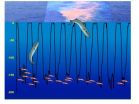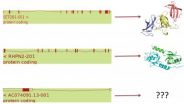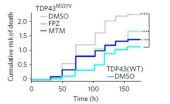(Press-News.org) Persons with reduced levels of the TREM2 protein could be at greater risk of developing neurodegenerative diseases such as Alzheimer's disease or frontotemporal dementia, according to an international study which included the participation of the Universitat Autònoma de Barcelona and the Sant Pau Biomedical Research Institute (IIB Sant Pau).
The study, published in Science Translational Medicine, reveals the molecular mechanism by which the mutated forms of this protein prevent the amyloid waste cleaning process from functioning correctly and detects a lower level of the functional form of this protein in the cerebrospinal fluid of people suffering from Alzheimer's disease and frontotemporal dementia.
The TREM2 gene is expressed mainly in the microglia, brain cells in charge of phagocytosis and of eliminating cell waste which accumulates in this organ, such as amyloid fibres and other protein aggregates. For some years now it has been known that mutations in TREM2 cause rare and aggressive neurodegenerative diseases known as Nasu-Hakola and FTD-like syndrome. Nevertheless, recent genetic studies have linked other less aggressive mutations in this gene to a higher risk of suffering from other more common neurodegenerative disorders, such as Alzheimer's disease, Parkinson's disease, Amyotrophic lateral sclerosis (ALS) and frontotemporal dementia.
In this study, led by Professor Christian Haass and DR Gernot Kleinberger from the Ludwig Maximilian University of Munich, the role played by TREM2 in the microglia when regulating its function as a phagocyte was revealed.
The study was conducted in two phases. In the first, carried out with microglial cell cultures, scientists observed that when mutated forms of TREM2 are expressed, the protein does not reach the cell membrane and the cells lose their ability to clean the residues accumulated in the brain.
In the second phase, researchers observed in the analyses carried out that patients with Alzheimer's disease or frontotemporal dementia tended to have low levels of TREM2 in their cerebrospinal fluid, while patients with FTD-like syndrome completely lacked this protein.
"Although we must still continue researching, these results suggest that the TREM2 protein plays a fundamental role in the elimination of amyloids and other protein aggregates and its malfunctioning can accelerate neurodegenerative processes. It could also be a useful indicator of neurodegenerative diseases", explains Marc Suárez-Calvet, pre-doctoral researcher at the UAB and participant in the study.
The stimulation of TREM2 functions could be a useful strategy when fighting neurodegenerative diseases, the study indicates. "It would be good to continue with the research and observe if acting on the TREM2 to restore or increase its activity could be effective in treating different neurodegenerative pathologies", concludes Albert Lleó, IBB researcher and lecturer at the UAB Department of Medicine.
INFORMATION:
Also participating in the study were IBB researchers Daniel Alcolea and Juan Fortea, as well as the research team led by Dr José Luís Molinuevo, from the Clínic Hospital of Barcelona.
Original article: http://stm.sciencemag.org/content/6/243/243ra86.abstract
Low brain protein levels associated with neurodegeneration
2014-07-03
ELSE PRESS RELEASES FROM THIS DATE:
Whales as ecosystem engineers
2014-07-03
"Consider the subtleness of the sea; how its most dreaded creatures glide under water, unapparent for the most part," wrote Herman Melville in Moby Dick. Today, we no longer dread whales, but their subtlety remains. "For a long time, whales have been considered too rare to make much of a difference in the oceans," notes University of Vermont conservation biologist Joe Roman. That was a mistake.
In a new paper, Roman and a team of biologists have tallied several decades of research on whales from around the world; it shows that whales, in fact, make a huge difference—they ...
No two lark sparrows are alike (at least when it comes to migration habits)
2014-07-03
A new paper by Dr. Jeremy Ross from the University of Oklahoma describes the use of tiny devices strapped to birds' backs called geolocators, which capture the individual migration routes of lark sparrows in North America. By sensing the light levels, these backpacks can pinpoint the location of a bird anywhere in the world, even if retrieving the data-logger can sometimes pose a major problem.
This study, published in the online journal Animal Migration, mapped for the first time the routes traveled by three lark sparrows after they left their breeding grounds in Ohio. ...
Consider water use in climate change policies, advise Australian researchers
2014-07-03
There's more to trying to slow down climate change than just cutting greenhouse gas emissions. Technology, policies or plans that aim to do so should also take environmental factors such as water usage into account. A more integrated approach might make some options considerably more attractive than others, especially when implemented in arid countries such as Australia, advise Philip Wallis of Monash University in Australia and colleagues, in an article in Springer's journal Climatic Change.
The researchers considered the example of Australia to show how water usage ...
Jump to it! A frog's leaping style depends on the environment
2014-07-03
VIDEO:
Tree frogs reach great heights with their jumps, but do not cover much distance.
Click here for more information.
A frog's jump is not as simple as it seems....Australian scientists have discovered that different species adopt different jumping styles depending on their environment.
Lead researcher, Miss Marta Vidal-Garcia ( PhD candidate, Australian National University ), found that tree dwelling frogs reached great heights but didn't cover much distance with their ...
Study finds higher risk for celiac disease in some children
2014-07-03
AURORA, Colo. (July 3, 2014) – Physicians from the University of Colorado School of Medicine in collaboration with an international team of researchers have demonstrated that screening of genetically susceptible infants can lead to the diagnosis of celiac disease at a very early age.
The collaborative group studied 6,403 children with specific genetic markers from birth to identify the factors involved in the development of both celiac disease and type 1 diabetes. The children are from the United States, Finland, Germany and Sweden and are part of The Environmental Determinants ...
Biological signal processing: Body cells -- instrumentalists in a symphony orchestra
2014-07-03
Every organism has one aim: to survive. Its body cells all work in concert to keep it alive. They do so through finely tuned means of communication. Together with cooperation partners from Berlin and Cambridge, scientists at the Luxembourg Centre for Systems Biomedicine (LCSB) of the University of Luxembourg have now successfully revealed for the first time the laws by which cells translate signals from their surroundings into internal signals. Like an isolated note in a symphony orchestra, an isolated signal in the cell is of subordinate importance. "What is important ...
A CNIO team reduces the size of the human genome to 19,000 genes
2014-07-03
How nutrients are metabolised and how neurons communicate in the brain are just some of the messages coded by the 3 billion letters that make up the human genome. The detection and characterisation of the genes present in this mass of information is a complex task that has been a source of ongoing debate since the first systematic attempts by the Human Genome Project more than ten years ago.
A study led by Alfonso Valencia, Vice-Director of Basic Research at the Spanish National Cancer Research Centre (CNIO) and head of the Structural Computational Biology Group, and ...
Could boosting brain cells' appetites fight disease? New research shows promise
2014-07-03
ANN ARBOR, Mich. — Deep inside the brains of people with dementia and Lou Gehrig's disease, globs of abnormal protein gum up the inner workings of brain cells – dooming them to an early death.
But boosting those cells' natural ability to clean up those clogs might hold the key to better treatment for such conditions.
That's the key finding of new research from a University of Michigan Medical School physician scientist and his colleagues in California and the United Kingdom. They reported their latest findings this week in the journal Nature Chemical Biology.
Though ...
Ironing out details of the carbon cycle
2014-07-03
Iron is present in tiny concentrations in seawater. On the order of a few billionths of a gram in a liter.
"I did a calculation once on a ton of ocean water," says Seth John, an assistant professor in the department of marine science at the University of South Carolina. "The amount of iron in that ton of water would weigh about as much as a single eyelash."
Given that there is so little iron in seawater, one might conclude that its presence there is inconsequential.
Hardly. Iron is one of the essential elements of life. Found in enzymes like myoglobin and hemoglobin ...
Science Elements podcast highlights the science of fireworks
2014-07-03
The July feature of Science Elements, the American Chemical Society's (ACS') weekly podcast series, shines the spotlight on the science of fireworks, just in time for the July 4th holiday. The episode is available at http://www.acs.org/scienceelements.
Independence Day is a time for picnics, parades and, of course, fireworks. Those beautiful explosions in the sky would be nothing without chemistry. In today's episode, Science Elements talks to the man who literally wrote the book on fireworks.
"Everything you see in a fireworks display is chemistry in action," says ...




